Dates for your Diary
Sat 4th Dec - Winterfest 10am – 6pm
Sat 11th Dec – Coffee Morning – Quiz/ mince pies
Sat 18th Dec – Coffee Morning - Folk music Christmas recital
Museum opening times
The Museum is open to the public, free of charge:
Thursday* to Saturday 10am – 1pm
November 100 Club
This month’s prize numbers were drawn by members Val Rosser and Gaynor Tucker and the lucky winners are:-
No. 13 Alyson Staples £20
No. 15 Lyn Bearcroft £10
If you would like to join our 100 club and be in with a chance of winning, it costs just £1 a month. Ask at the museum for further details.
Christmas Closure
The museum will close at 1pm on 18th December and re-open at 10.00am Thursday 6th January 2022
New - Members’ Loyalty card!
It’s that time of year again when we ask you to renew your membership. The fee is just £6 for standard membership and £25 for Vice Presidents and if you are a taxpayer, and have not already done so, please come in and sign a Gift Aid declaration so that we can claim another 25p for each pound given at no extra cost to you. All subscriptions received help with our running costs. And, this year as a thank you, when you renew your membership you will receive a ‘Loyalty Card’ entitling you to one free hot drink in our café every month of the year starting January 2022. The cards are ready and waiting, so don’t delay, renew today! May I take this opportunity to thank all our members and volunteers for their support this past year and to wish you all a very merry Christmas and a happy new year.
December Events
This is going to a busy month with our annual Christmas Fayre coinciding with Winterfest on Saturday 4th December when the museum will be open all day until 6pm. As well as our usual stalls, story-telling and face painting will be on offer at the museum. We have a raffle with numerous prizes and tickets are on sale now with the raffle being drawn on Saturday 18th December. Join us on Saturday 11th December for a coffee morning with a Christmas quiz and mince pies and then the last Saturday before Christmas (18th) there will be another coffee morning with a folk music Christmas recital. Coffee mornings charged at £2 (£1.50 for members) including hot drink and cake.
We have lost a Vice President this month, Salvation Army Officer, Mr Simon Campbell, who has been a supporter for many years has now had to move for health reasons. We wish him well and thank him for his support over the years.
Thank You
Peggy Bearcroft wishes to convey her gratitude for all the support and messages of condolence she has received following the loss of her husband, Don.
The English Breakfast
Coffee Tea Cocoa / Porridge / Fried Whiting, Yarmouth Kipper / Grilled Ham, Bacon Tomatoes / Eggs - Fried, Poached, Boiled / Cold Boiled Shoulder Bacon / Jam, Marmalade.
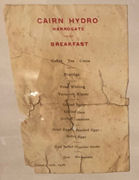 If you were staying at the Cairn Hotel in Harrogate on the 12th January 1926, that would have been your breakfast menu. I, like many others, have holidayed in this country a lot of late and have eaten more English breakfasts than is probably good for me. At each hotel I stayed in, the format differed slightly and when I saw this old menu from 1926 on display at the Cairn Hotel, it got me thinking about the history of the English breakfast…
If you were staying at the Cairn Hotel in Harrogate on the 12th January 1926, that would have been your breakfast menu. I, like many others, have holidayed in this country a lot of late and have eaten more English breakfasts than is probably good for me. At each hotel I stayed in, the format differed slightly and when I saw this old menu from 1926 on display at the Cairn Hotel, it got me thinking about the history of the English breakfast…
The word ‘breakfast’ comes from ‘breaking the fast’ (of the night) and its roots can be traced back to the 1300s and started with the ‘gentry’; the wealthy landowners and those of noble blood who liked to show off their wealth by hosting breakfast ‘feasts’ of meat, fruit and cheeses especially before going out on a hunt or embarking on a long journey. The commoners though would have to make do with bread and dripping with perhaps a little cheese and washed down with ale. With weddings always taking place in the morning in those days, the first meal the new bride and groom would have would be a lavish breakfast, hence the term ‘wedding breakfast’ that we still use today.
During the reign of Victoria, the English breakfast was a very elegant affair with only the best silver and glassware used. Like the gentry before them, they wanted to show off their wealth and refinement but it was the Edwardian period leading up to the First World War that saw the English breakfast start to truly resemble what we know and love today.
Edwardians would dine on orange juice followed by bacon, eggs and cold meats such as tongue with perhaps kidneys or kippers thrown in for good measure. This would be followed with toast and marmalade or jam and a pot of tea. It was also a tradition for the morning papers to be read over breakfast. It was (and still is) the only meal of the day where it is socially acceptable to read at the table while in company which is why you will still see newspapers free to read in cafés serving breakfast today; at least they were until Covid struck!
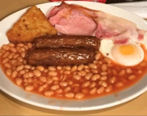 By the early 1950s, the tradition of a big breakfast was commonplace among the working classes. With a lot of jobs involving hard physical labour, it made sense to start the day with a good meal to see you through and with women tending to be stay-at-home mothers, they had the time to make sure their men had a hearty breakfast to set them up for the day. These days breakfast at home tends to be a hurried affair of cereal and/or toast with the ‘cooked breakfast’ turning into an ‘all day breakfast’ and usually eaten as the evening meal, which is certainly the case at my home!
By the early 1950s, the tradition of a big breakfast was commonplace among the working classes. With a lot of jobs involving hard physical labour, it made sense to start the day with a good meal to see you through and with women tending to be stay-at-home mothers, they had the time to make sure their men had a hearty breakfast to set them up for the day. These days breakfast at home tends to be a hurried affair of cereal and/or toast with the ‘cooked breakfast’ turning into an ‘all day breakfast’ and usually eaten as the evening meal, which is certainly the case at my home!
Talking of cereals, in my research of the English breakfast, I find virtually no mention of them which is most likely because (apart from porridge) they didn’t become popular until the 1950s, and yet my mother always impressed on me that the ‘Full English’ was in fact a three course meal with the first course being fruit juice or cereal (not both), followed by your ‘cooked breakfast’ and finally toast with jam or marmalade as a separate course and not added to the plate with your cooked breakfast like many places do today. This was certainly my experience of the Full English on the numerous occasions I stayed in English hotels with my parents during the 60s and 70s and aside from now having cereal and fruit juice, it remains much the same today.
When I first holidayed on the continent in 1970, the breakfast was a dismal affair of just bread rolls served with tasteless unsalted butter. With two fussy children to feed, my mother would visit the nearest food store and buy ‘Mantequilla con sal’ (salted butter) and large juicy peaches both of which we would take into the dining room to make our breakfast more palatable! I can still enjoy a peach as part of my breakfast to this day. These days of course, most overseas hotels that welcome British tourists offer the full range of options we have become accustomed to, making the English Breakfast a truly global phenomenon.
Sally Murphy
Sourced from Historic UK and The English Breakfast Society
Dropped Scones
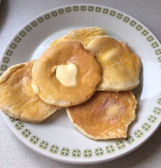 If reading about the English breakfast has made you hungry, here’s a very easy recipe which my mother would make for my sister and I as children though she called them ‘pikelets’ and we ate them (and still do) for tea on a Sunday afternoon. Americans call these scones ‘pancakes’ and eat them for breakfast! They are so-called ‘dropped’ scones because the mixture is ‘dropped’ onto a hot baking stone or large frying pan. Butter and eat while still warm and they will melt in your mouth!
If reading about the English breakfast has made you hungry, here’s a very easy recipe which my mother would make for my sister and I as children though she called them ‘pikelets’ and we ate them (and still do) for tea on a Sunday afternoon. Americans call these scones ‘pancakes’ and eat them for breakfast! They are so-called ‘dropped’ scones because the mixture is ‘dropped’ onto a hot baking stone or large frying pan. Butter and eat while still warm and they will melt in your mouth!
The following quantities make approx 15
- 100g (4 ozs) self-raising flour
- 2 tablespoons caster sugar
- 1 egg
- 125ml (¼ pint / 5 fl ozs) milk
- Pinch of salt
- Butter or margarine of your choice
Method
- Put flour, egg, milk, sugar and salt in a bowl and mix to a smooth creamy batter
- Brush a large frying pan with melted butter and heat
- Using a tablespoon, drop (hence the name) rounds of the scone mixture onto the heated pan
- Cook until bubbles show on the surface (less than 1 minute)
- Flip over using a thin bladed knife and cook the other side until golden brown
(note - second side is even quicker to cook)
- Transfer to a plate and immediately add lashings of butter
- Eat while still warm!
Annual General Meeting
Our AGM held last month heralded a number of important changes. With the sad loss of Don, we lost not only our advisory Curator but a Director and in his place we welcome Mrs Karen Pratley as a Director who will be joining Mr Trevor Cook, Mr Mike Purchase, Mr Richard Gilson, Mrs Peggy Bearcroft, Mrs Jennifer Price and Miss Lucy Harding.
We are pleased to report that Mrs Peggy Bearcroft has agreed to be our new Curator, aided by Mr Gareth Murphy as Deputy Curator while Miss Lucy Harding will take over from Peggy as our new Chair of Committee.
Mrs Karen Pratley is remaining as Treasurer and while we are sad to lose Mrs Margaret Dyer who is standing down as Secretary after many years service, we are pleased to welcome Mrs Jen Price in her place. We are also pleased to welcome Mrs Liz Ewers and Ms Katie Morgan to committee.
Amazon Smile
Do you shop on-line at Amazon? If so, have you heard of Amazon Smile? Amazon Smile is a way of shopping at Amazon while supporting your favourite charity at no extra cost to yourself and, thanks to volunteer Katie Morgan, the museum has now been signed up as a beneficiary.
How it Works
Think of it as going to the same store but just going in through a different door. So instead of going to amazon.co.uk, you simply go to smile.amazon.co.uk instead where you will find the exact same products at the exact same prices. The first time you go to the Amazon Smile website, you will be asked to choose which charity you wish to support; this is a once only task unless you wish to change to another charity of course, which you are free to do at any time. Choose Abertillery Museum as your preferred charity (we hope), and then the museum will receive 0.5% of all eligible items you purchase and it won’t cost you a penny more. And if you prefer to shop on your mobile phone or tablet using the Amazon app, you can turn on ‘Smile’ in the apps settings. So next time you shop at Amazon, think Amazon Smile!
Many thanks to Cliff Powis for his very generous donation of £50. Cliff, a long-term resident of Abertillery, has led a colourful and interesting life. He was one of the first paramedics in Wales, was a major factor in securing defibrillators in Abertillery and was recognised for his services to the NHS by being awarded the British Empire Medal in the Queen’s Birthday list in 2017. He was also Abertillery’s first qualified driving instructor.
Special Thanks
Grateful thanks to everyone who has supplied material for this newsletter this year, but special thanks must go to Jennifer Price, who has contributed practically every month!
‘I Had A Dream’
In ‘The Tempest’, Shakespeare writes ‘we are such stuff as dreams are made on and our little life is rounded with a sleep’. Such words surely reflect the life of the late Curator of Abertillery Museum, Don Bearcroft.
Don, a founder member, took up the reins of Curator on the demise of Bill Deasy. Soon he was to face the daunting task of having to re-locate the museum from the town library to its present site at the Metropole. The success of the move was to prove game-changing! Having settled in its new home, Don set about achieving his life-long ambition of creating a vibrant, accessible, professionally-run museum, free for the people of Abertillery. In other word’s a ‘People’s Museum’.
The road ahead was both long and hazardous; to paraphrase Shakespeare ‘When troubles come, they come not singly but in battalions’. But Don, together with his loyal wife Peggy and his ‘Band of Brothers’, never wavered from his set course. When Don sadly passed away on 16th October aged 78, it was in the sure and certain knowledge that his dream had become a reality; a People’s Museum that ranked among the very foremost of Welsh small museums.
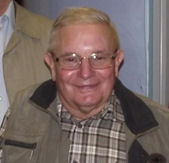 So the question is, how are we to commemorate the life’s work of Don Bearcroft? Perhaps we should emulate the example of Sir Christopher Wren; no grandiose memorial for him but rather the words written by his son beneath the Great Dome of St Paul’s Cathedral ‘If you would seek his monument, look around’.
So the question is, how are we to commemorate the life’s work of Don Bearcroft? Perhaps we should emulate the example of Sir Christopher Wren; no grandiose memorial for him but rather the words written by his son beneath the Great Dome of St Paul’s Cathedral ‘If you would seek his monument, look around’.
Trevor Cook
Don Bearcroft
I was asked to write a few words about Don but when I sat down with a pen and paper I thought "Where on earth do I start?" Don was Curator of the museum for almost thirty years and having first taken on that post when the museum was housed in a small room at the library and then in the equally small room which now serves as our office, it was a very proud moment when he became Curator of the wonderful museum we have today. It was a long and difficult journey beset with problems and it was undoubtedly Don's determination and enthusiasm that got us there in the end. The accompanying photo (see below), taken in 2016, shows Don wearing the Curator's badge of which he was so proud.
Don's health wasn't the best, even when I first met him all those years ago but he never let it stop him and if he couldn't do something himself, he would supervise someone else doing it. Trevor has spoken of the "Band of Brothers" – what a lively bunch of men they were, always ready to pitch in and always exchanging friendly banter even when dealing with something as unwieldy as the railway display board from Aberbeeg Signal Box.
Don would often dress up at our Christmas Fayres and other events – Father Christmas or an elf or something – he didn't mind a silly costume if it meant publicity and funds for the museum. Back in those days when we were all younger, Don also led some walks taking in features of local history including one to the ‘Dog Stone’ (a memorial to a dog on Coity mountain). Don's passing is very sad but he outlived many of the people who were active in the museum at that time and who went on his walks and the museum coach trips.
Needless to say, Don was passionate about local history and this came 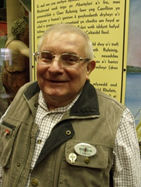 out in his dealings with visitors – whether greeting our former President, Sir Richard Hanbury Tenison with whom Don built a close relationship that went beyond an exchange of formalities, or welcoming school children to the museum. The many photographs of Don surrounded by school children shows how keen he was to pass on his knowledge and enthusiasm and how keen the children were to learn.
out in his dealings with visitors – whether greeting our former President, Sir Richard Hanbury Tenison with whom Don built a close relationship that went beyond an exchange of formalities, or welcoming school children to the museum. The many photographs of Don surrounded by school children shows how keen he was to pass on his knowledge and enthusiasm and how keen the children were to learn.
Trevor Cook has quoted from Shakespeare. I can't match that but I will say that as Don was a man ready to cope with any contingency, he was truly "A Man For All Seasons". He will be much missed.
Jen Price
Top Of Page
